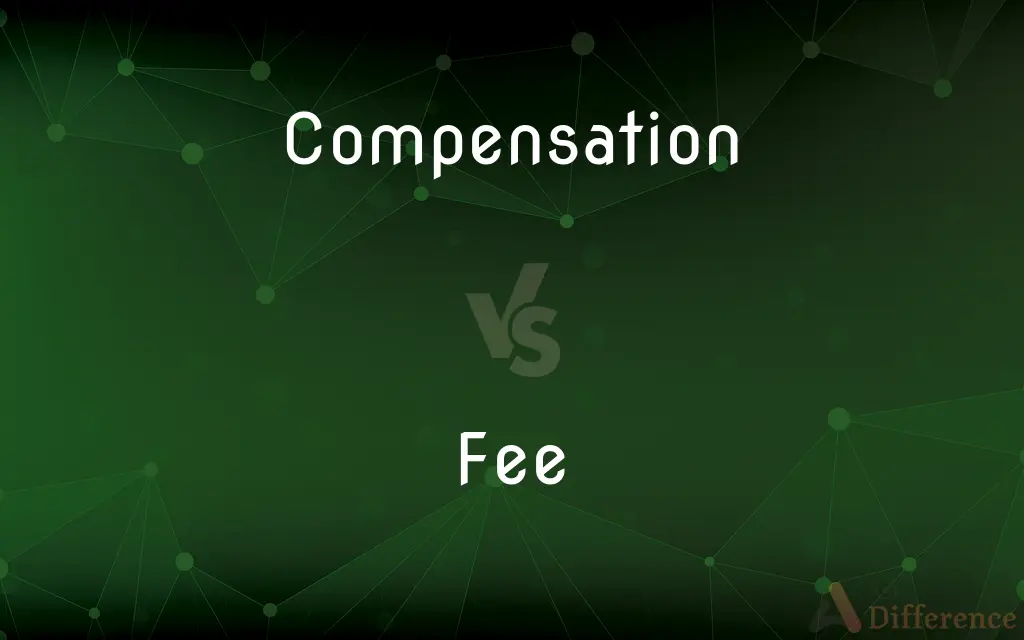Compensation vs. Fee — What's the Difference?
By Fiza Rafique & Maham Liaqat — Updated on March 27, 2024
Compensation refers to the total payment and benefits received for work done or services provided, whereas a fee is a specific charge for a service or privilege.

Difference Between Compensation and Fee
Table of Contents
ADVERTISEMENT
Key Differences
Compensation encompasses a wide range of payments and benefits given to employees or service providers for their work or services. This includes salaries, wages, bonuses, and benefits such as health insurance, retirement contributions, and paid leave. For example, an employee's compensation package might include their annual salary, health benefits, and stock options. On the other hand, a fee is a set amount charged for a particular service or privilege, like a consultation fee charged by a lawyer or a service fee for processing a transaction. Fees are typically agreed upon in advance and are not dependent on the recipient's performance.
Compensation is often reflective of an ongoing employment or contractual relationship, suggesting a broader engagement than the provision of a single service. It aims to reward and retain talent within an organization or to remunerate someone fairly for their continuous services. In contrast, fees are transactional, usually associated with specific, often one-time services rendered by professionals or through the use of certain facilities, like entry fees for parks or subscription fees for software.
The structure of compensation is usually determined by factors such as industry standards, job roles, experience, and performance outcomes. It's designed to motivate and sustain a workforce or service provider over the long term. Conversely, fees are generally fixed based on the cost of the service provided, market rates, or regulatory guidelines, and they do not typically vary with the recipient's performance but might change based on market conditions or the complexity of the service.
Negotiation plays a key role in determining both compensation and fees. However, the negotiation of compensation can be more complex, involving various elements like base pay, bonuses, and non-monetary benefits. Fee negotiations, while still significant, usually revolve around the cost of a specific service or product and are often more straightforward.
Legal and tax implications also differ between compensation and fees. Compensation may include various taxable and non-taxable elements, subject to employment laws and tax regulations, affecting both the payer and the recipient. Fees, while also subject to taxation, often have different tax treatments and legal considerations, depending on the nature of the service and the jurisdiction.
ADVERTISEMENT
Comparison Chart
Definition
Total payment and benefits for work or services
Specific charge for a service or privilege
Components
Salaries, wages, bonuses, benefits
Set charges for particular services
Relationship
Reflects ongoing employment or service agreement
Transactional, often for one-time services
Determination Factors
Job role, experience, performance
Service cost, market rate, regulatory guidelines
Negotiation
Involves multiple elements and benefits
Usually focuses on the cost of a specific service
Legal and Tax Implications
Subject to employment laws, various tax treatments
Different tax treatments, legal considerations
Compare with Definitions
Compensation
Total remuneration including salary, bonuses, and benefits.
Her compensation at the tech firm includes a base salary, stock options, and a health plan.
Fee
Often associated with professional services.
The lawyer charges a flat fee for drafting contracts.
Compensation
Payment received for services rendered within an employment context.
The company's compensation policy includes performance-based bonuses.
Fee
A specific amount charged for a service, right, or privilege.
The consultant set a fee of $200 per hour for her services.
Compensation
Often structured to motivate and retain employees.
Competitive compensation packages are essential for attracting top talent.
Fee
Can be one-time or recurring, depending on the service.
The software subscription fee is billed annually.
Compensation
Broad term covering various forms of work-related payments.
Workers' compensation provides financial support to employees injured on the job.
Fee
Typically agreed upon in advance for certain transactions.
Bank fees for international transfers can vary significantly.
Compensation
Can include non-monetary benefits valuable to employees.
Flexible working hours are part of our overall compensation strategy.
Fee
Fixed based on service complexity or market rates.
Entrance fees for the museum are discounted for students.
Compensation
The act of compensating or the state of being compensated.
Fee
A fee is the price one pays as remuneration for rights or services. Fees usually allow for overhead, wages, costs, and markup.
Compensation
Something, such as money, given or received as payment or reparation, as for a service or loss.
Fee
A fixed sum charged, as by an institution or by law, for a privilege
A license fee.
Tuition fees.
Compensation
(Biology) The increase in size or activity of one part of an organism or organ that makes up for the loss or dysfunction of another.
Fee
A charge for professional services
A surgeon's fee.
Compensation
(Psychology) The act of consciously or unconsciously changing one's behavior to offset a real or imagined deficiency, as in personality or physical ability.
Fee
A tip; a gratuity.
Compensation
The act or principle of compensating.
Fee
(Law) See fee simple.
Compensation
Something which is regarded as an equivalent; something which compensates for loss.
Fee
In feudal law, an estate in land granted by a lord to his vassal on condition of homage and service. Also called feud2, fief.
Compensation
(finance) The extinction of debts of which two persons are reciprocally debtors by the credits of which they are reciprocally creditors; the payment of a debt by a credit of equal amount.
Fee
The land so held.
Compensation
A recompense or reward for service.
Fee
To give a tip to.
Compensation
(real estate) An equivalent stipulated for in contracts for the sale of real estate, in which it is customary to provide that errors in description, etc., shall not avoid, but shall be the subject of compensation.
Fee
(Scots) To hire.
Compensation
The relationship between air temperature outside a building and a calculated target temperature for provision of air or water to contained rooms or spaces for the purpose of efficient heating. In building control systems, the compensation curve is defined to a compensator for this purpose.
Fee
(feudal law) A right to the use of a superior's land, as a stipend for services to be performed; also, the land so held; a fief.
Compensation
(neuroscience) The ability of one part of the brain to overfunction in order to take over the function of a damaged part (e.g. following a stroke).
Fee
(legal) An inheritable estate in land held of a feudal lord on condition of the performing of certain services.
Compensation
The act or principle of compensating.
Fee
(legal) An estate of inheritance in land, either absolute and without limitation to any particular class of heirs (fee simple) or limited to a particular class of heirs (fee tail).
Compensation
That which constitutes, or is regarded as, an equivalent; that which makes good the lack or variation of something else; that which compensates for loss or privation; amends; remuneration; recompense.
The parliament which dissolved the monastic foundations . . . vouchsafed not a word toward securing the slightest compensation to the dispossessed owners.
No pecuniary compensation can possibly reward them.
Fee
(obsolete) Property; owndom; estate.
Compensation
The extinction of debts of which two persons are reciprocally debtors by the credits of which they are reciprocally creditors; the payment of a debt by a credit of equal amount; a set-off.
Fee
(obsolete) Money paid or bestowed; payment; emolument.
Compensation
Something (such as money) given or received as payment or reparation (as for a service or loss or injury)
Fee
(obsolete) A prize or reward. Only used in the set phrase "A finder's fee" in Modern English.
Compensation
(psychiatry) a defense mechanism that conceals your undesirable shortcomings by exaggerating desirable behaviors
Fee
An additional monetary payment charged for a service or good that is minor compared to the underlying cost.
Compensation
The act of compensating for service or loss or injury
Fee
To reward for services performed, or to be performed; to recompense; to hire or keep in hire; hence, to bribe.
Fee
Property; possession; tenure.
Once did she hold the gorgeous East in fee.
Fee
Reward or compensation for services rendered or to be rendered; especially, payment for professional services, of optional amount, or fixed by custom or laws; charge; pay; perquisite; as, the fees of lawyers and physicians; the fees of office; clerk's fees; sheriff's fees; marriage fees, etc.
To plead for love deserves more fee than hate.
Fee
A right to the use of a superior's land, as a stipend for services to be performed; also, the land so held; a fief.
Fee
An estate of inheritance supposed to be held either mediately or immediately from the sovereign, and absolutely vested in the owner.
Fee
An estate of inheritance belonging to the owner, and transmissible to his heirs, absolutely and simply, without condition attached to the tenure.
Buy the fee simple of my life for an hour and a quarter.
Fee
To reward for services performed, or to be performed; to recompense; to hire or keep in hire; hence, to bribe.
The patient . . . fees the doctor.
There's not a one of them but in his houseI keep a servant feed.
Fee
A fixed charge for a privilege or for professional services
Fee
An interest in land capable of being inherited
Fee
Give a tip or gratuity to in return for a service, beyond the agreed-on compensation;
Remember to tip the waiter
Fee the steward
Common Curiosities
What differentiates compensation from a fee?
Compensation includes all forms of payment and benefits for work, while a fee is a specific charge for a service or privilege.
Why is compensation often more complex than fees?
Compensation encompasses a range of payments and benefits, including salaries, bonuses, and non-monetary benefits, making it more complex than straightforward service charges.
How are fees determined?
Fees are determined based on the cost of the service, market rates, or regulatory guidelines, and are agreed upon in advance.
Are fees always monetary?
While fees are typically monetary, in some contexts, they could involve barter or exchange of services, though this is less common.
Can a fee be part of compensation?
Typically, fees are separate from compensation, as they are charges for specific services rather than overall remuneration for employment or contractual work.
How does the negotiation process differ between compensation and fees?
Negotiation for compensation can involve various components like base pay and benefits, while fee negotiations typically revolve around service costs.
Why might a professional prefer a fee for service rather than a salary?
Professionals might prefer fees for specific services to maintain flexibility, control over their workload, or to capitalize on market rates for specialized services.
How do businesses decide on the structure of compensation for their employees?
Businesses consider factors such as industry standards, job roles, performance, and the competitive landscape to structure employee compensation.
Can the concept of fees apply to products as well as services?
Generally, fees are associated with services, but similar concepts can apply to products in terms of delivery charges, installation fees, etc.
Can both compensation and fees be negotiated?
Yes, both can be negotiated, but compensation negotiations may involve multiple elements, while fee negotiations usually focus on the cost of a specific service.
How do market rates influence fees?
Market rates can significantly influence fees, as they reflect the going rate for similar services within a specific industry or geographical area.
Is a salary the same as a fee?
No, a salary is a form of compensation paid for employment, while a fee is a charge for a particular service.
What legal considerations affect compensation?
Compensation is affected by employment laws, minimum wage regulations, overtime pay requirements, and other legal standards related to labor and employment.
Do compensation and fees have different tax implications?
Yes, they are subject to different tax treatments and legal considerations, often influenced by employment laws and the nature of the service.
What role do benefits play in compensation?
Benefits are a key component of compensation, adding value to the total remuneration package and often influencing job satisfaction and loyalty.
Share Your Discovery

Previous Comparison
Polyp vs. Medusa
Next Comparison
Bryophyte vs. PteridophyteAuthor Spotlight
Written by
Fiza RafiqueFiza Rafique is a skilled content writer at AskDifference.com, where she meticulously refines and enhances written pieces. Drawing from her vast editorial expertise, Fiza ensures clarity, accuracy, and precision in every article. Passionate about language, she continually seeks to elevate the quality of content for readers worldwide.
Co-written by
Maham Liaqat













































